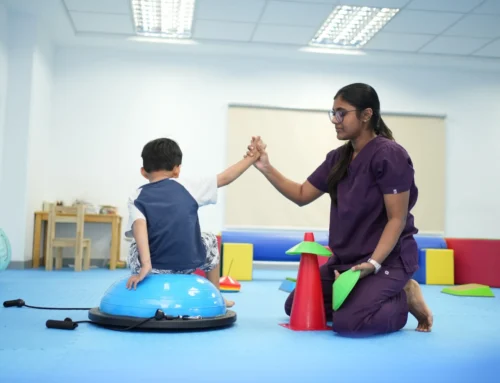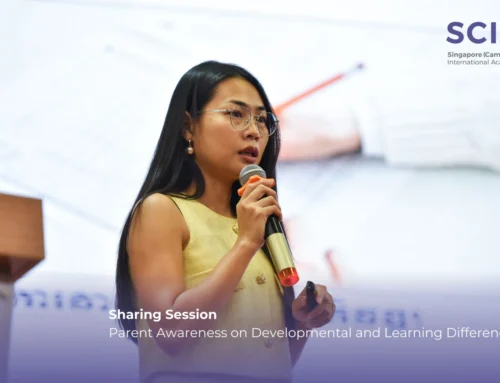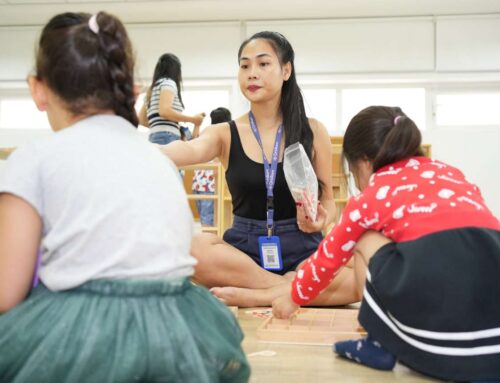Every child deserves the chance to live with confidence, independence, and joy. But for many families in Phnom Penh, day-to-day routines like brushing teeth, using a pencil, or paying attention in class can become daily battles. These struggles are often signs of developmental delays or sensory processing challenges—and they shouldn’t be ignored. That’s where occupational therapy makes all the difference.
At OrbRom Center, children receive holistic, individualized occupational therapy services that support growth across physical, emotional, and cognitive domains. With a focus on empowering both children and parents, OrbRom is helping Phnom Penh families transform frustration into progress, and setbacks into success.
What Exactly Is Occupational Therapy?
Occupational therapy (OT) for children is not about finding a job—it’s about helping children build the everyday skills they need to participate fully in life. These “occupations” include:
-
Playing
-
Dressing
-
Eating
-
Writing and drawing
-
Participating in school
-
Regulating emotions
-
Developing attention and coordination
OT helps bridge the gap between a child’s current abilities and the demands of everyday life. By using play-based and sensory-informed strategies, occupational therapists help children grow stronger, more confident, and more capable—one step at a time.
The Growing Need for OT in Phnom Penh
In Cambodia, especially in urban areas like Phnom Penh, more families are becoming aware of developmental differences. However, mainstream schools still struggle to accommodate children with autism, ADHD, sensory disorders, or motor coordination issues. These children are often misunderstood or mislabeled—despite having tremendous potential.
Occupational therapy addresses the root causes of behaviors that interfere with learning and daily functioning. When combined with a safe, professional environment like OrbRom Center, OT can become a life-changing intervention.
Common Challenges Addressed by OT
Children may need occupational therapy for a wide variety of reasons. At OrbRom Center, OT services are most commonly used to help children with:
Fine Motor Delays
-
Difficulty holding pencils or feeding themselves
-
Trouble with zippers, buttons, and other hand tasks
-
Avoidance of writing or drawing
Sensory Processing Issues
-
Being overwhelmed by sounds, lights, or textures
-
Constant fidgeting or crashing into things
-
Difficulty calming down or transitioning between activities
Attention and Regulation
-
Trouble sitting still or focusing in class
-
Impulsive behavior
-
Poor frustration tolerance
Daily Living Delays
-
Struggles with getting dressed, brushing teeth, or using utensils
-
Delayed independence in age-appropriate tasks
These challenges are not a reflection of laziness or misbehavior. They’re signs that a child’s sensory, cognitive, or motor systems need support—and that’s exactly what OT is designed to provide.
What Makes OrbRom Center Different?
In Phnom Penh, OrbRom Center has become a trusted name for quality occupational therapy. Here’s what sets it apart:
1. Individualized Assessments
Each child begins their journey with a comprehensive developmental assessment. Therapists observe motor skills, sensory responses, emotional regulation, and communication behaviors. This informs a fully customized intervention plan.
2. Sensory-Inclusive Therapy Rooms
OrbRom provides a calming, structured environment with equipment like swings, tactile walls, therapy balls, and fine motor stations—specifically designed to meet sensory needs.
3. Qualified Pediatric Therapists
OrbRom’s occupational therapists are highly trained and experienced in working with children with autism, ADHD, developmental delays, and sensory processing disorders. Therapy sessions are evidence-based and child-centered.
4. Family-Centered Support
Parental involvement is essential. OrbRom works closely with families to ensure that therapy strategies are practiced at home and progress is shared in real-time. This strengthens results across settings.
5. School Collaboration
If your child attends a school in Phnom Penh, OrbRom can coordinate with teachers to align therapy goals with classroom expectations—bridging home, therapy, and school environments.
A Typical OT Session at OrbRom Center
Sessions are 60 to 90 minutes, depending on the child’s age and needs. They include a mix of the following:
-
Sensory warm-up activities (swings, pressure, proprioceptive tasks)
-
Fine motor games (pegboards, beads, handwriting practice)
-
Functional life skills (dressing, feeding, organizing school materials)
-
Emotional and behavioral coaching (self-regulation strategies, breathing techniques)
-
Parental debriefing to share updates and progress
Therapy looks like play—but every game, movement, and tool serves a specific developmental goal.
Real Stories from Phnom Penh Families
Mealea, mother of a 6-year-old boy with autism:
“Before OT, my son couldn’t hold a spoon or sit for five minutes. Now he’s eating on his own and participating in group play. He feels proud—and so do we.”
Nara, whose daughter has sensory processing issues:
“Loud noises and bright lights used to cause meltdowns. Through sensory integration at OrbRom, she’s learned how to calm herself. We’ve seen huge changes at home and school.”
These transformations don’t happen overnight—but with the right therapy and support, they are absolutely possible.
How Occupational Therapy Supports School Success
OT doesn’t replace academics—it strengthens the foundation for academic readiness and classroom performance.
Key skills supported by OT include:
-
Pencil control and handwriting
-
Sitting posture and endurance
-
Following instructions and routines
-
Managing transitions between subjects
-
Reducing distractions through sensory regulation
-
Emotional control during frustrating tasks
Whether your child is in preschool or primary school, occupational therapy can directly impact how well they participate, retain information, and connect with peers.
Is It Too Early or Too Late for OT?
Parents often ask: “Is my child too young or too old to benefit from OT?”
The truth is, there is no wrong age. Early intervention (under age 6) is ideal, as children’s brains are still developing rapidly. However, older children can still gain substantial benefit—especially when therapy is paired with consistent strategies at home and school.
If you’re unsure, the best step is to schedule an assessment. The earlier you start, the easier it is to build new skills and prevent long-term frustration or academic setbacks.
How to Start Occupational Therapy at OrbRom
If you’re ready to explore occupational therapy for your child, here’s how to begin:
-
Book an Initial Consultation
This includes a developmental screening and discussion about your child’s history and current challenges. -
Complete a Full Assessment
This allows therapists to evaluate fine and gross motor skills, sensory responses, attention, and daily living skills. -
Start the Program
Once the assessment is complete, your child begins a personalized therapy schedule. -
Receive Regular Progress Updates
Parents are kept in the loop with updates, home exercises, and new goals every few weeks.
Conclusion
Occupational therapy is more than treatment—it’s a roadmap to independence, confidence, and success. Whether your child is struggling with fine motor tasks, sensory regulation, or focus in school, early intervention through OT can make a lifelong difference.
At OrbRom Center in Phnom Penh, families find more than therapy—they find guidance, partnership, and a team that genuinely cares. Don’t wait for small challenges to become larger roadblocks. The right support is available, and the path to progress begins today.







